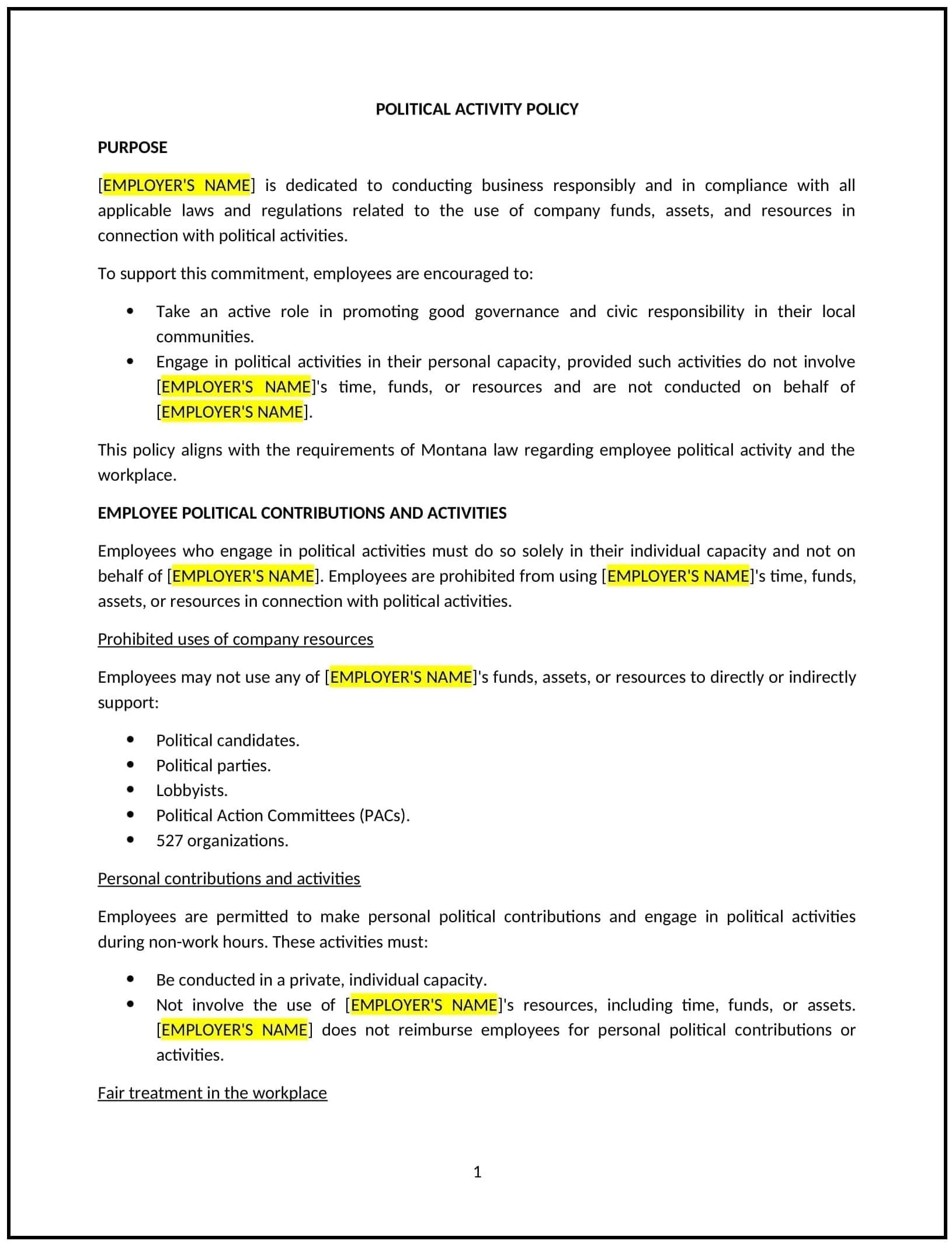Got contracts to review? While you're here for policies, let Cobrief make contract review effortless—start your free review now.

Customize this template for free
Political activity policy (Montana)
A political activity policy helps Montana businesses define the guidelines for employee involvement in political activities, both during work hours and in personal time. This policy outlines the company's stance on political participation, political donations, and the use of company resources for political purposes, ensuring that employees can engage in political activity while maintaining a professional and non-partisan work environment.
By implementing this policy, businesses can maintain neutrality, avoid conflicts of interest, and protect their reputation, while respecting employees' rights to engage in political activities outside of work.
How to use this political activity policy (Montana)
- Define political activities: The policy should define what constitutes political activity, including political donations, campaign work, lobbying, or publicly endorsing candidates or political parties.
- Set guidelines for political activity during work hours: The policy should specify that employees should refrain from engaging in political activities during work hours or using company resources for political purposes, such as using office equipment, email, or social media.
- Address political donations: The policy should clarify whether the company allows political donations or financial support for political campaigns and, if so, the process for making donations through the company, ensuring that no conflicts of interest arise.
- Set guidelines for political activity outside of work: While employees have the right to engage in political activities outside of work, the policy should remind employees that they should avoid representing the company in a political context or using company assets in their personal political activities.
- Establish neutrality: The policy should emphasize that the business remains neutral in political matters, and that political views should not influence decisions regarding employment, promotions, or other workplace matters.
- Encourage respectful discourse: The policy should encourage employees to engage in political discussions respectfully and professionally, ensuring that political opinions do not interfere with team collaboration or create a hostile work environment.
- Review and update regularly: The policy should be reviewed periodically to ensure it is aligned with any changes in laws, business needs, or political climate, and to ensure it remains relevant and effective.
Benefits of using this political activity policy (Montana)
This policy provides several key benefits for Montana businesses:
- Maintains neutrality: A clear political activity policy helps businesses maintain neutrality in political matters, preventing potential conflicts of interest and ensuring that political views do not affect business decisions.
- Protects the company's reputation: By establishing boundaries for political activity, businesses can protect their reputation by ensuring that employees' personal political views do not reflect poorly on the company.
- Encourages professionalism: The policy helps ensure that political discussions and activities do not disrupt the workplace or harm professional relationships between employees, fostering a respectful work environment.
- Reduces legal risks: A well-defined policy can help businesses avoid legal risks, such as claims of discrimination or unfair treatment based on political views or activities.
- Promotes respect for diversity: The policy encourages employees to respect diverse political views, promoting inclusivity and maintaining harmony in the workplace.
- Enhances transparency: A clear policy establishes expectations for employees regarding political activity, ensuring that everyone is aware of the company's stance and the boundaries that should be observed.
Tips for using this political activity policy (Montana)
- Communicate the policy clearly: Ensure that all employees are aware of the political activity policy and understand the boundaries between personal political involvement and professional conduct.
- Be transparent about political donations: If the company allows political donations, clearly outline the process, restrictions, and approval procedures for making donations to ensure transparency and avoid conflicts of interest.
- Maintain a neutral stance: The policy should emphasize the company’s commitment to neutrality in political matters and specify that employees should not engage in political activity in a way that could be perceived as representing the company.
- Encourage respect in political discourse: Encourage employees to engage in political discussions with respect for others' opinions, ensuring that political activity does not create a divisive or hostile environment.
- Monitor adherence to the policy: Ensure that the policy is being followed by regularly monitoring for any misuse of company resources for political purposes or disruptive political activity in the workplace.
- Review and update regularly: Regularly review the policy to ensure it aligns with the company's goals, legal requirements, and any changes in the political or business landscape.